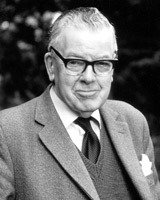
Back إف. إف. بروس Arabic اف. اف. بروس ARZ Frederick Fyvie Bruce German F. F. Bruce French F.F. Bruce ID Frederick Fyvie Bruce Italian フレドリク・ブルース Japanese 프레드릭 페비 브루스 Korean Frederick Fyvie Bruce Dutch Frederick Fyvie Bruce Polish
This article has multiple issues. Please help improve it or discuss these issues on the talk page. (Learn how and when to remove these template messages)
|
F. F. Bruce | |
|---|---|
 | |
| Born | Frederick Fyvie Bruce 12 October 1910 |
| Died | 11 September 1990 (aged 79) Buxton, Derbyshire, England |
| Nationality | Scottish |
| Title | Rylands Professor of Biblical Criticism and Exegesis at the Victoria University of Manchester |
| Academic background | |
| Alma mater | |
| Academic work | |
| Discipline | Biblical studies |
| Institutions | |
Frederick Fyvie Bruce FBA (12 October 1910 – 11 September 1990), usually cited as F. F. Bruce, was Rylands Professor of Biblical Criticism and Exegesis at the University of Manchester from 1959 until 1978 and one of the most influential evangelical scholars of the second half of the twentieth century. His importance comes from the fact that when the academic community looked down upon Evangelicals, Bruce demonstrated that a scholar holding evangelical views could do worthwhile academic work. At the same time, he persuaded Evangelicals that they should not turn their backs on academic methods of Bible study, even if the results might differ from traditional evangelical views. As a result, he has been called the "Dean of Evangelical Scholarship".[1]
I. Howard Marshall remembered F. F. Bruce "first of all for his highly distinguished academic career as a university teacher and a prolific writer who did more than anybody else in this [the 20th] century to develop and encourage conservative evangelical scholarship. Possessed of outstanding intellectual ability, a phenomenal memory, encyclopedic knowledge, a colossal capacity for work, and a limpid style, he produced a remarkable output of books and essays that will continue to be read for years to come, and he trained directly or indirectly many younger scholars now working in all parts of the world."[2]
"The issues which, for Bruce, were non-negotiable," said his biographer Tim Grass, "may be summarized as the reliability of the New Testament, the person and work of Christ, the Christian life as one of forgiveness and liberty as befits those who are being led by the Spirit, and the right and duty of every believer to use whatever gifts God has given them."[3]
F. F. Bruce was charitable, gentle, and respected those with whom he disagreed and those who disagreed with him. He seemed to be genuinely humble, teachable, and diplomatic. J. I. Packer said, "No Christian was ever more free of narrow bigotry, prejudice and eccentricity in the views he held and the way he held them; no man did more to demonstrate how evangelical faith and total academic integrity may walk hand in hand."[4]
- ^ "Authors: F. F. Bruce". C. S. Lewis Institute.
- ^ Marshall, I. Howard. ""Editorial: Professor F. F. Bruce"". Evangelical Quarterly. 62 (4): 291.
- ^ Grass, Tim (2012). F. F. Bruce: A Life. Milton Keynes, UK: Paternoster Press. ISBN 978-0-8028-6723-0.
- ^ Thomson, David. "Fred Bruce: The renowned Bible Scholar from Elgin".
© MMXXIII Rich X Search. We shall prevail. All rights reserved. Rich X Search